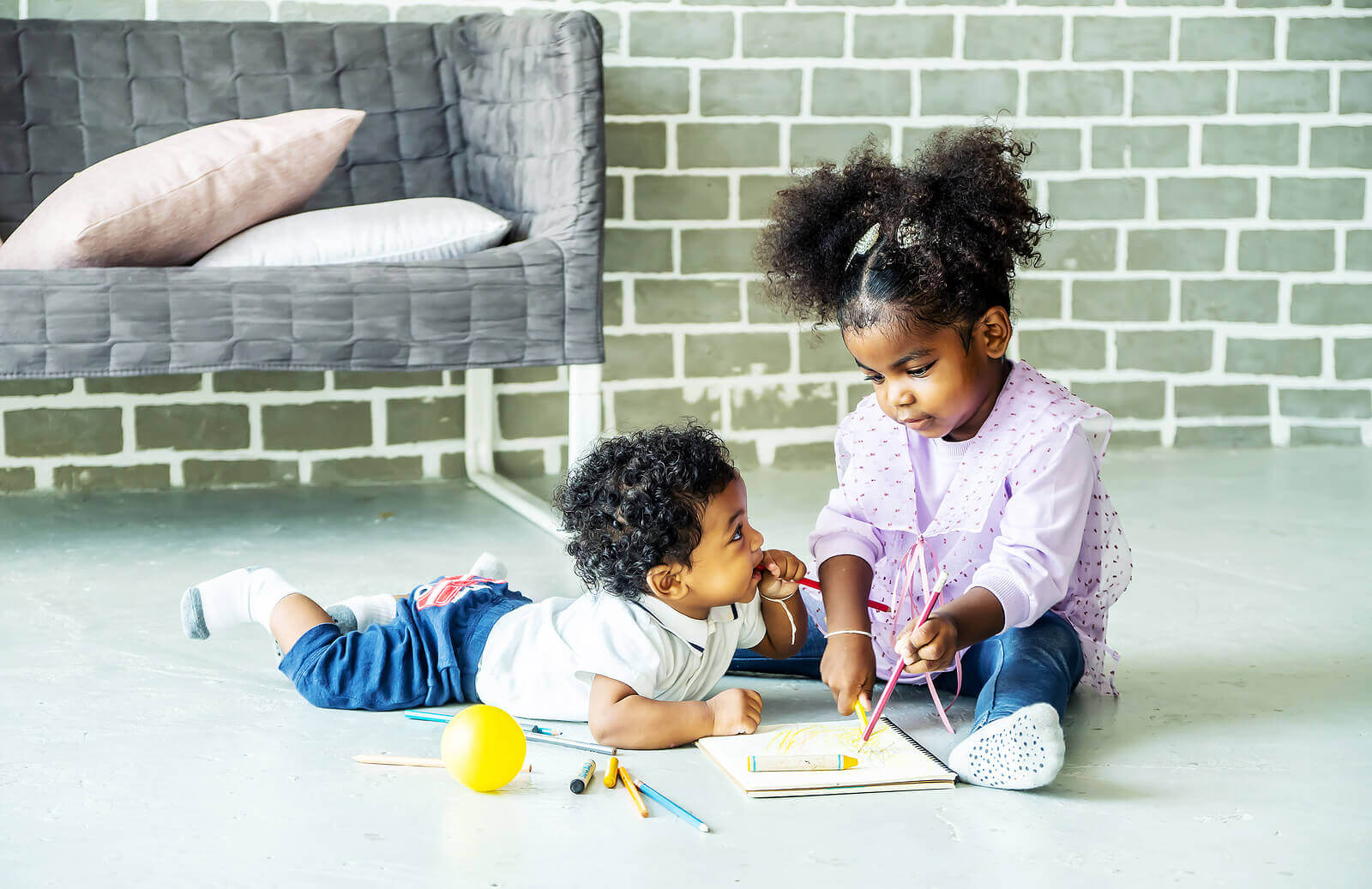Find Out How to Stimulate Children's Intelligence

During the first years of a child’s life, their cognitive development progresses at great speed. Through interaction with the environment, they acquire the ability to understand and develop. This process takes place naturally and progressively; however, there’s much more that adults can do to stimulate children’s intelligence.
If children don’t grow up in rich and stimulating environments, they won’t develop their full potential. For example, there have been documented cases of infants who were deprived of socialization during their early years and this deeply affected many of their abilities.
However, to stimulate children’s intelligence we have to keep in mind that it encompasses many different areas.
In general, we tend to associate intelligence with linguistic or mathematical ability, and also the grades children get in school.
However, intelligence is much broader than that. As we can clearly see from the theory of multiple intelligences, aspects such as music, body movement, and social relationships need to be equally enhanced. That’s why we’d like to share some of the keys that can help you achieve this.

How to stimulate children’s intelligence?
Healthy life habits
First of all, we have to look after the child’s physical sphere because, even though we’re trying to stimulate them at a cognitive level, both aspects are closely related. Because of that, it’s important to take care of their habits and make sure that they maintain a healthy lifestyle. In particular, we should focus on three areas:
- Sufficient, quality rest is essential in order to enable children to consolidate learning and restore the energy consumed during the day. If their sleep is scarce or frequently interrupted, we’ll be preventing these important brain functions from taking place. In addition, the next day the child won’t be able to function properly in school or other activities.
- Food also has great importance in the development of intelligence. After all, it’s what provides children’s brains with the nutrients they need. Therefore, it’s essential that they maintain a varied and balanced diet, rich in fruits and vegetables. They should also avoid sugars and processed foods as much as possible.
- In addition to that, children need to get used to regular physical exercise in their daily lives. Playing sports helps to oxygenate the body, but it also boosts physical intelligence, social intelligence (especially in the case of team sports), and musical intelligence (in the case of activities such as dancing).
New experiences
When it comes to stimulating intelligence, there’s no greater enemy than routine. Therefore, try to provide your children with varied experiences. These can be of any kind: visiting museums, walking in nature, reading different books, or participating in activities with other children. Any new experience will nourish and enrich their mind in an important way.
From these experiences children won’t only gain new knowledge, but will also awaken their curiosity and expand their social skills. A variety of people, environments, and activities are the best ingredients to keep their minds stimulated. However, it’s not necessary to have mind-blowing events or experiences all the time. Introducing small variations in everyday life can be enough.
Different challenges
Finally, to stimulate a child’s intelligence we have to help them stay mentally active. To do this, we can propose different challenges that can encourage them to test and develop their skills.
Schoolwork already fulfills this mission in some ways, but at home we can contribute to this by proposing recipes, crafts or board games.

Stimulating intelligence on a daily basis
As you can see, intelligence can be stimulated on a daily basis through everyday tasks. It isn’t necessary to resort to complex activities or extensive training. In fact, it’s the daily experiences that nurture children’s intelligence the most.
It’s important not to restrict ourselves to enhancing children’s logical and cognitive skills. All other types of intelligence are of equal value and will also be highly beneficial to them. Fortunately, with most of the activities we’ve mentioned, you’ll be able to address several of these facets of your child’s intelligence.
During the first years of a child’s life, their cognitive development progresses at great speed. Through interaction with the environment, they acquire the ability to understand and develop. This process takes place naturally and progressively; however, there’s much more that adults can do to stimulate children’s intelligence.
If children don’t grow up in rich and stimulating environments, they won’t develop their full potential. For example, there have been documented cases of infants who were deprived of socialization during their early years and this deeply affected many of their abilities.
However, to stimulate children’s intelligence we have to keep in mind that it encompasses many different areas.
In general, we tend to associate intelligence with linguistic or mathematical ability, and also the grades children get in school.
However, intelligence is much broader than that. As we can clearly see from the theory of multiple intelligences, aspects such as music, body movement, and social relationships need to be equally enhanced. That’s why we’d like to share some of the keys that can help you achieve this.

How to stimulate children’s intelligence?
Healthy life habits
First of all, we have to look after the child’s physical sphere because, even though we’re trying to stimulate them at a cognitive level, both aspects are closely related. Because of that, it’s important to take care of their habits and make sure that they maintain a healthy lifestyle. In particular, we should focus on three areas:
- Sufficient, quality rest is essential in order to enable children to consolidate learning and restore the energy consumed during the day. If their sleep is scarce or frequently interrupted, we’ll be preventing these important brain functions from taking place. In addition, the next day the child won’t be able to function properly in school or other activities.
- Food also has great importance in the development of intelligence. After all, it’s what provides children’s brains with the nutrients they need. Therefore, it’s essential that they maintain a varied and balanced diet, rich in fruits and vegetables. They should also avoid sugars and processed foods as much as possible.
- In addition to that, children need to get used to regular physical exercise in their daily lives. Playing sports helps to oxygenate the body, but it also boosts physical intelligence, social intelligence (especially in the case of team sports), and musical intelligence (in the case of activities such as dancing).
New experiences
When it comes to stimulating intelligence, there’s no greater enemy than routine. Therefore, try to provide your children with varied experiences. These can be of any kind: visiting museums, walking in nature, reading different books, or participating in activities with other children. Any new experience will nourish and enrich their mind in an important way.
From these experiences children won’t only gain new knowledge, but will also awaken their curiosity and expand their social skills. A variety of people, environments, and activities are the best ingredients to keep their minds stimulated. However, it’s not necessary to have mind-blowing events or experiences all the time. Introducing small variations in everyday life can be enough.
Different challenges
Finally, to stimulate a child’s intelligence we have to help them stay mentally active. To do this, we can propose different challenges that can encourage them to test and develop their skills.
Schoolwork already fulfills this mission in some ways, but at home we can contribute to this by proposing recipes, crafts or board games.

Stimulating intelligence on a daily basis
As you can see, intelligence can be stimulated on a daily basis through everyday tasks. It isn’t necessary to resort to complex activities or extensive training. In fact, it’s the daily experiences that nurture children’s intelligence the most.
It’s important not to restrict ourselves to enhancing children’s logical and cognitive skills. All other types of intelligence are of equal value and will also be highly beneficial to them. Fortunately, with most of the activities we’ve mentioned, you’ll be able to address several of these facets of your child’s intelligence.
All cited sources were thoroughly reviewed by our team to ensure their quality, reliability, currency, and validity. The bibliography of this article was considered reliable and of academic or scientific accuracy.
- Muelas, R. (2019a, julio 17). Los «niños salvajes» y su comportamiento en la sociedad. Recuperado diciembre de 2020, de https://lamenteesmaravillosa.com/los-ninos-salvajes-comportamiento-la-sociedad/
- Gardner, H. (1987). La teoría de las inteligencias múltiples. Santiago de Chile: Instituto Construir. https://d1wqtxts1xzle7.cloudfront.net/51558533/La_Teoria_de_las_Inteligencias_Multiples_cortad.pdf?1485806088=&response-content-disposition=inline%3B+filename%3DLa_Teoria_de_las_Inteligencias_Multiples.pdf&Expires=1608637007&Signature=LR8slUPMrC3KlCXhnYjRSTl~bFxxGumH3U1wjwBbnwjnkyVTJIiCoRQVQxpgx9JUoL8boee~q0Ss5cXabnVUYJJ2hHw9uq6wVfplq-6uPLnJpEX9j63TO3E3yZqI1wKDWi0ULmAzeyWr9EFGoKJwcdMrLFtExT1lE40A2Hs3oyo7Ufco2dRvepsnBnUYCY3jYx90G9jvssrEjPtQtVo24l4EvHeasQ~NWm9kxtwSQ~WpdXhMGunEscR4lkkuliofpgrUMy5pnMEpjLvI~zQJCjJcG6yszNA4WfI1Q4DIqLVY0IQ9Rbq~5uw0kxEJrxWrsLn85P7DGhWWtWJVkRDJpA__&Key-Pair-Id=APKAJLOHF5GGSLRBV4ZA
- Cortez, V. D. (2013). La nutrición y su relación con el desarrollo de la inteligencia. Guía para padres destinada a mejorar la calidad de alimentación en niños y niñas de 4 a 5 años en etapa inicial del centro de desarrollo infantil “Función Judicial” del DM de Quito durante el año lectivo. 2012-2013 (Bachelor’s thesis). https://dspace.cordillera.edu.ec/bitstream/123456789/2871/1/8-EDU-12-13-1718673328.pdf
This text is provided for informational purposes only and does not replace consultation with a professional. If in doubt, consult your specialist.








